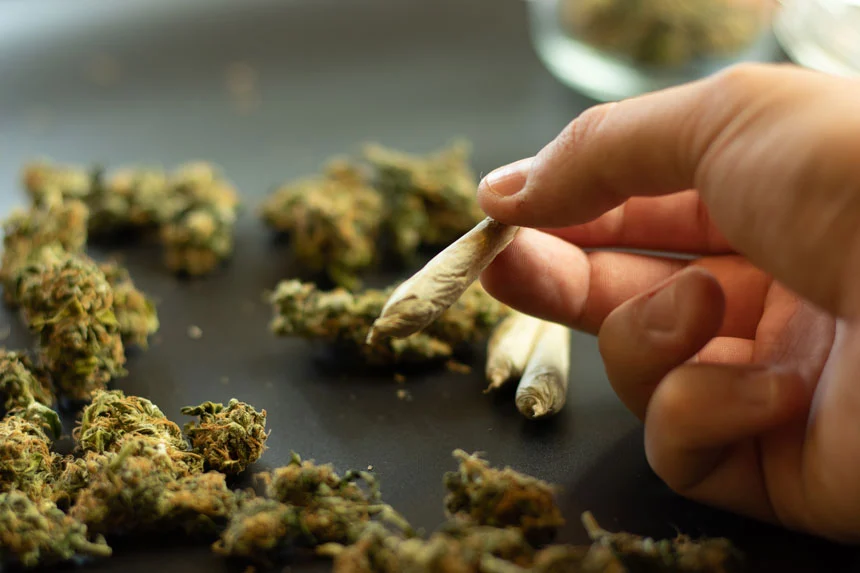What is Adderall?
Table of Contents
- What is Adderall?
- What Makes Adderall Addictive?
- Side Effects of Adderall
- Adderall Overdose
- What is Weed?
- What Makes Weed Addictive?
- Are there Side Effects of Weed?
- Is It Dangerous to Mix Adderall and Weed?
- Why Do People Mix Adderall and Weed?
- What are the Side Effects of Mixing Adderall and Weed?
- The Hidden Dangers of Mixing Adderall and Weed
- Addiction Treatment for Adderall and Weed
- Managing Withdrawal Symptoms
- Find the Top Addiction Treatment Options For You, Here
- Medically Reviewed By
Adderall is a prescription drug used to treat Attention Deficit Hyperactivity Disorder (ADHD). It is currently considered a Schedule I stimulant by the Drug Enforcement Administration (DEA), meaning that while it has an accepted medical usage, it may pose a risk for substance abuse. Adderall and weed are often abused in conjunction and can pose risks for many individuals. Read our guide to find out all the details!
Attention Deficit Hyperactivity Disorder
Stimulants such as Adderall or other prescription drugs, including Dexedrine, are most commonly used to treat ADHD symptoms. These may include behavioral issues or difficulties with paying attention and organization.
This is because Adderall works to regulate chemical imbalances in the brain of individuals with ADHD. Thus, regularly taking a prescribed dose of this drug can help individuals to be more productive and balanced.
What Makes Adderall Addictive?
As a central nervous system stimulant, Adderall can have a high risk for abuse when used by individuals who do not need it.
This is because they release dopamine, amongst other chemicals, into the brain, triggering an individual’s reward and pleasure systems. Increased stimulation in these areas can produce euphoric effects when not used to treat a chemical imbalance in the brain.
This may also create feelings of extreme wakefulness and focusing abilities, overestimation of one’s skills or capabilities, and increased physical energy.
In fact, Adderall’s ability to allow individuals to hyper-focus and resist sleep has earned it the nickname of “the study drug” amongst many college students who try using this drug to increase their academic performance.
Most forms of this medication will produce effects that last one to three hours. However, extended release forms of Adderall stay in a person’s system for up to 12 hours.
Side Effects of Adderall
To some individuals, non-prescribed Adderall use may feel somewhat safe because of its clinical background; this, however, is very much not the case. In fact, there are several dangerous effects associated with misusing Adderall, including:
- Anxiety
- Nervousness or restlessness
- Difficulty sleeping
- Headaches
- Stomach pains
- Nausea and vomiting
- Dry mouth
- Diarrhea or constipation
- Loss of appetite
- Weight loss or gain
- Uncontrollable shaking
- Changes in sex drive
There are also several more serious consequences associated with Adderall abuse, which can require professional medical attention to resolve. This is particularly true with long-term Adderall misuse, often resulting in side effects such as:
- Irregular heartbeat
- Shallow breathing
- Slowed speech
- Impaired thinking
- Dizziness
- Seizures
- Weakness or numbness in the limbs
- Chest pains
- Excessive fatigue and exhaustion
- Motor and verbal tics
- Paranoia
- Hallucinations
- Mania
- Aggressive or violent behavior
- Blurred vision
- Facial swelling
- Hoarseness
- Fever
- Skin blisters
- Rash or hives
Adderall Overdose
As with many forms of substance abuse, it is possible to overdose on adderall; particularly when taken unnecessarily, or when combining adderall with other substances. There are several warning signs associated with adderall overdose, including:
- Aggression
- Extreme anxiety or panic
- Depression
- Blurry vision
- Disorientation
- Hallucinations
- Rapid breathing
- Uncontrollable shaking
- Rapid heart rate
- Increased blood pressure
- Fever
- Upset stomach and diarrhea
- Extreme fatigue
- Muscle aches and weakness
- Breakdown of muscle tissue
- Urine that is dark brown or red in color
- Fainting or other loss of consciousness
- Tremors
- Seizures
If you or someone else is experiencing any of these symptoms, it is strongly recommended to immediately notify emergency services, as these can quickly become life-threatening if not properly treated.
What is Weed?
Marijuana, or weed, refers to a drug derived from the cannabis plant, or Cannabis sativa, typically used for the various effects it can have on the parasympathetic nervous system. It is a psychoactive drug that is classified as a stimulant, depressant, and hallucinogen.
The main psychoactive component found in most forms of weed is delta-9-tetrahydrocannabinol (THC), a chemical responsible for a majority of the cognitive effects this drug produces.
What Makes Weed Addictive?
While many people believe that using marijuana will not lead to a drug problem, this is not necessarily true. Particularly amongst young adults, continued usage of this drug can result in the development of substance abuse problems.
This is mostly due to the relaxing and enjoyable effects smoking marijuana or consuming an edible can have. Addiction to weed is particularly common amongst those struggling with mental health conditions.
This is primarily due to the temporary relief using weed or other substances can provide from the negative thoughts and emotions that their mental illness may cause. Thus, they may repeatedly use weed in order to continue avoiding these difficult feelings.
Are there Side Effects of Weed?
There are several side effects that can occur from using weed, some of which can be potentially dangerous if not in a safe or controlled environment. These may include:
- Altered senses (i.e., distorted sense of time, touch, smell, etc.)
- Mood changes
- Impaired cognitive function (i.e. trouble with thinking, movement, or memory)
- Risk of psychosis
- Hallucinations
There are also several negative side effects that can result from long-term marijuana use, including:
- Complications with brain development
- A decline in general knowledge
- A decline in verbal communication abilities
- Difficulty breathing
- Increased heart rate
- Pregnancy complications
- Extreme nausea and vomiting
Is It Dangerous to Mix Adderall and Weed?
Generally, it is never recommended to mix two or more substances together, as these combinations can have harmful effects. Particularly when mixing Adderall and Weed, these two substances can produce unpredictable effects.
Furthermore, it can be particularly dangerous to mix Adderall with any other substance, as stimulants can have various negative effects on their own.
Thus, choosing to combine Adderall with additional drugs may cause individuals to be at an increased risk of severe adverse health risks. When it comes to mixing weed with this stimulant, this remains just as true.
Why Do People Mix Adderall and Weed?
In most cases, individuals engage in simultaneous Adderall and marijuana use because this may offset the negative effects these substances cause on their own.
However, this is not necessarily always the case, as both weed and Adderall can have unpredictable interactions, whether with each other or to an individual’s bodily and cognitive functions.
This behavior is particularly prominent in individuals struggling with simultaneous mental health and substance use disorders, or co-occurring disorders. For these people, mixing Adderall and weed may help relieve the psychological distress caused by their mental illness.
This, however, is not a guaranteed result of this combination, and will only provide temporary relief in the event that it does work as intended. Furthermore, repeated abuse of these substances, especially together, may only worsen these negative feelings over time.
What are the Side Effects of Mixing Adderall and Weed?
When people mix Adderall with weed, the interaction of these two drugs with one another can be particularly tricky to predict. This is because, while weed can at times act as a depressant, both Adderall and weed can be used as stimulants.
Thus, mixing Adderall and weed can result in a variety of interactions between these two drugs, either boosting their stimulant properties, or counteracting each other entirely. Furthermore, because there is no way of knowing how these two drugs will interact, there is no real way to safely mix Adderall and weed.
Mixing Adderall and Weed: Enhanced Stimulation
When both Adderall and weed act as stimulants while being used simultaneously, this can cause individuals to experience enhanced feelings of euphoria, increased stimulation and physical arousal, as well as potentially reduced levels of anxiety.
This is typically the most desired effect when mixing Adderall and weed, particularly amongst younger populations or individuals with high-demand and stressful jobs.
However, there is no way of guaranteeing this interaction, and it is certainly not worth the risk of developing an addiction to either or both of these substances.
Mixing Adderall and Weed: Dangerously Balanced
An addiction to Adderall can result in a number of issues, including arrhythmia or other abnormalities in a person’s heart rate. Choosing to use marijuana while experiencing this side effect of Adderall use can drastically worsen it due to the depressant properties of weed.
Some people may also experience a significant increase in physical side effects when mixing these two substances, such as nausea, vomiting, diarrhea, or numbness. This combination may also run the risk of negatively affecting particular mental illnesses.
For example, someone struggling with depression and anxiety may experience a drastic increase in both of these disorders due to Adderall’s stimulant nature and marijuana’s depressant properties.
The Hidden Dangers of Mixing Adderall and Weed
While less common, there is also a need to keep in mind the risk that comes with accidentally ingesting other illegal drugs when using these substances, particularly Adderall.
According to the Drug Enforcement Agency, it is becoming increasingly common for drug dealers to combine or mix other substances as a specific drug in order to increase their profits.
This, unfortunately, significantly increases their unknowing customers’ chances of experiencing significant adverse consequences from this drug use, including weed overdose.
While more common in drugs such as fentanyl or other amphetamine salts (i.e., cocaine), mixing substances for financial gain is not isolated to these.
Thus, even if an individual believes they are getting their product from a reliable source, there is always a risk of contamination when attempting to mix Adderall and Weed.
Addiction Treatment for Adderall and Weed
For individuals struggling with an addiction to marijuana or Adderall, or both, it is highly recommended that they seek out professional addiction treatment services. This may include:
While each of these treatment options have their own benefits, inpatient programs often have the highest success rates for long-term recovery from addiction. Of course, it is ultimately up to an individual to determine what treatment approach is best for them.
Speaking with a medical professional or addiction treatment specialist can also help narrow down these options.
Managing Withdrawal Symptoms
Something to keep in mind when seeking out treatment options for addiction is the withdrawal periods of specific substances. These can often produce particularly uncomfortable side effects, which may drastically increase an individual’s risk of relapsing during recovery.
While Adderall and weed withdrawal may not be as severe as substances such as opioids or alcohol, they can certainly be unpleasant. Thus, seeking professional help in achieving sobriety from these forms of drug abuse is highly recommended.
Symptoms of Adderall Withdrawal
When it comes to Adderall withdrawal, this can produce a number of psychological and physical side effects, including:
- Depression
- Mood swings
- Difficulty sleeping
- Extreme fatigue
- Nausea and vomiting
- Abdominal cramping
Symptoms of Weed Withdrawal
Typically appearing within the first week of stopping its usage, marijuana withdrawal symptoms may include:
- Irrational anger or aggressiveness
- Extreme nervousness or anxiety
- Insomnia, or disturbing dreams and nightmares
- Decreased appetite, which may lead to weight loss
- Restlessness
- Depression
- Abdominal pain
- Fever
- Chills
- Sweating
- Headache
- Tremors or uncontrollable shaking
Find the Top Addiction Treatment Options For You, Here
Whether it be to Adderall, weed, or any other substance, if you or a loved one is struggling with addiction, know that you are not alone, and help IS available.
Here at Find Addiction Rehabs, we are committed to connecting people like you with professional substance abuse treatment programs that can best fit your personal care needs.
Our hotline is available 24/7 to make sure you have access to addiction recovery resources and support any time you need it.
Call today, and one of our representatives can get you started on your recovery journey, where you can achieve long-term happiness, healthiness, and sobriety!
Nicole Rogers is an experienced and accomplished writer with special interests in the fields of Anthropology, English, and behavioral health, and has written countless articles for newspaper publications, institutional research journals, and Find Addiction Rehabs.
Her alma mater is Florida Atlantic University in Boca Raton. Nicole hopes to spread awareness of and combat the stigmatization surrounding addiction and substance abuse treatment through her writing and work in the field.




